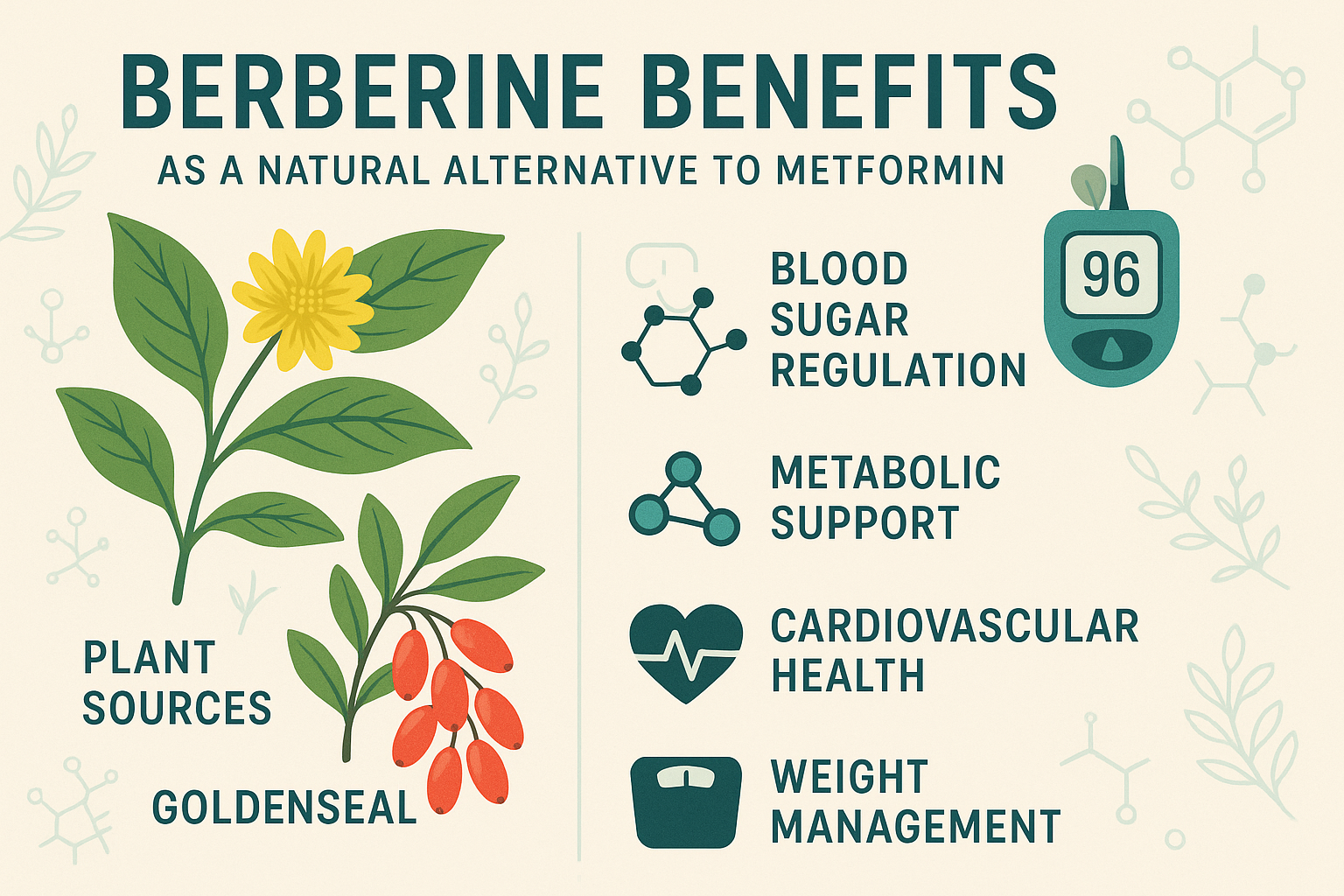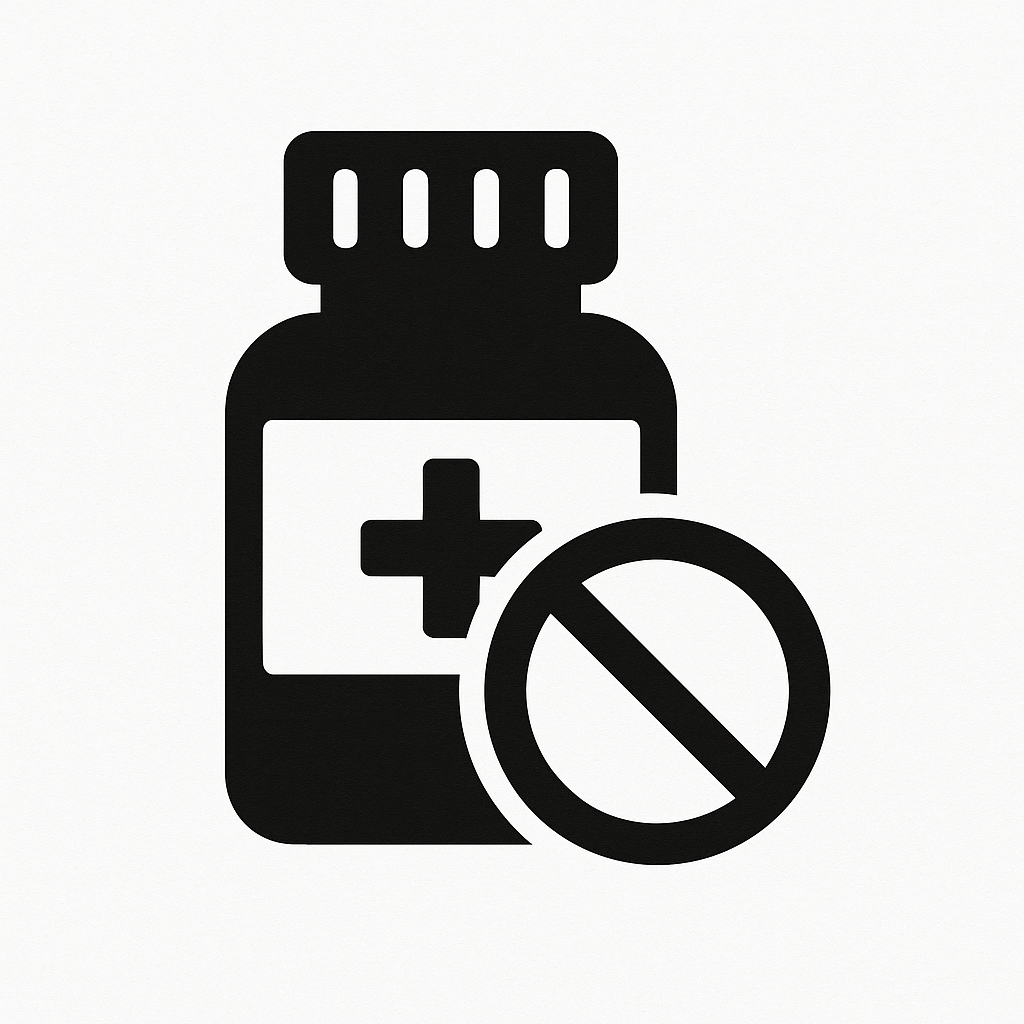
Unpacking Berberine Benefits: A Natural Alternative to Metformin?
In recent years, a golden-yellow compound extracted from various plants has captured the attention of both researchers and health enthusiasts. Berberine, a bioactive alkaloid used in traditional Chinese and Ayurvedic medicine for thousands of years, is now being touted as a natural alternative to Metformin, one of the most prescribed diabetes medications worldwide.
The comparison isn't unfounded. Multiple clinical studies have shown that berberine can lower blood sugar levels with effectiveness comparable to pharmaceutical drugs, while also offering benefits for weight management, cholesterol levels, and cardiovascular health. But before you rush to swap your prescription for this natural compound, it's essential to understand what the science actually says, how berberine works in your body, and what realistic expectations you should have.
This comprehensive exploration will unpack berberine's mechanisms, examine the research supporting its benefits, discuss its limitations, and help you determine whether this ancient remedy deserves a place in your modern health regimen.
What Exactly Is Berberine?
Berberine is a quaternary ammonium salt found in several plants, most notably in the roots, rhizomes, and stem bark of plants from the Berberis genus, including barberry, goldenseal, Oregon grape, and tree turmeric. Traditional medicine systems have used these plants for centuries to treat various ailments, from digestive issues to infections.
The compound itself has a distinctive yellow color and a bitter taste. While traditional practitioners used whole plant extracts, modern supplements contain concentrated berberine, typically extracted and purified to specific dosages. This standardization allows for more precise dosing and research into its specific effects.
What makes berberine particularly interesting from a scientific perspective is its ability to activate an enzyme called AMP-activated protein kinase, or AMPK. Often called the "metabolic master switch," AMPK plays a crucial role in regulating energy metabolism at the cellular level. This mechanism is key to understanding berberine's wide-ranging effects on blood sugar, weight, and metabolic health.
The AMPK Connection: How Berberine Works
To appreciate berberine's potential, you need to understand AMPK. Think of AMPK as your cells' fuel gauge and energy regulator. When activated, AMPK signals that cellular energy is low, triggering a cascade of metabolic changes to restore balance.
AMPK activation produces several beneficial effects: it increases glucose uptake into cells, enhances insulin sensitivity, promotes fat burning, reduces fat storage, improves mitochondrial function, and decreases inflammation. These are precisely the metabolic improvements that people with insulin resistance, prediabetes, type 2 diabetes, and metabolic syndrome need.
Berberine activates AMPK through multiple pathways, but one primary mechanism involves temporarily inhibiting complex I of the mitochondrial respiratory chain. This creates a mild energy deficit that triggers AMPK activation. It sounds concerning, but this effect is temporary and actually mimics some of the beneficial metabolic stress created by exercise and caloric restriction.
Interestingly, Metformin works through similar pathways, which explains why berberine's effects on blood sugar are often compared to this pharmaceutical drug. However, berberine also influences other metabolic pathways beyond AMPK, contributing to its broad spectrum of benefits.
Berberine and Blood Sugar: The Evidence
The most extensively researched benefit of berberine is its effect on blood glucose levels. Multiple clinical trials have examined berberine's efficacy for managing blood sugar in people with type 2 diabetes, prediabetes, and metabolic syndrome.
A landmark study published in Metabolism: Clinical and Experimental compared berberine directly to Metformin in newly diagnosed type 2 diabetics. Over three months, participants taking 500 mg of berberine three times daily showed reductions in fasting blood glucose, post-meal blood glucose, and hemoglobin A1c (a measure of average blood sugar over three months) comparable to those taking Metformin. The berberine group's fasting blood glucose dropped from an average of 10.6 mmol/L to 7.0 mmol/L—a clinically significant improvement.
Another study published in the Journal of Clinical Endocrinology and Metabolism examined berberine in people with poorly controlled type 2 diabetes who were already taking other diabetes medications. Adding berberine to their existing regimen significantly improved their blood sugar control, suggesting berberine could work synergistically with conventional treatments.
A comprehensive meta-analysis published in Evidence-Based Complementary and Alternative Medicine reviewed 14 studies involving over 1,000 participants. The analysis concluded that berberine significantly reduced fasting blood glucose, post-meal blood glucose, hemoglobin A1c, and insulin levels. The effects were similar to standard diabetes medications including Metformin, glipizide, and rosiglitazone.
The mechanisms behind these blood sugar benefits are multifaceted. Berberine increases insulin sensitivity in cells, making them more responsive to insulin's signals. It enhances glucose uptake in muscle and liver cells through AMPK activation. The compound also appears to slow carbohydrate absorption in the intestines and may influence gut bacteria in ways that improve glucose metabolism. Additionally, berberine can reduce glucose production in the liver, addressing one of the key problems in type 2 diabetes.
Weight Management and Metabolic Effects
Beyond blood sugar control, berberine has shown promise for weight management and broader metabolic improvements. This makes sense given its effects on AMPK and cellular metabolism, but the research demonstrates real-world effects beyond just laboratory mechanisms.
A 12-week study published in Phytomedicine examined berberine's effects in people with metabolic syndrome. Participants taking berberine lost an average of five pounds and reduced their body mass index by 2.3 points, without making significant dietary changes. Even more impressively, they lost visceral fat—the dangerous fat surrounding internal organs that's strongly linked to metabolic disease and cardiovascular risk.
The weight loss effects appear to stem from multiple mechanisms. Berberine increases thermogenesis—the production of heat in brown adipose tissue—which burns calories. It improves the function of hormones that regulate fat storage and appetite, including insulin, leptin, and adiponectin. AMPK activation shifts metabolism toward fat burning rather than fat storage. Some research also suggests berberine influences gut bacteria composition in ways that may prevent weight gain and reduce inflammation.
It's important to note that berberine isn't a magic weight loss pill. The weight loss observed in studies is modest—typically ranging from 3 to 8 pounds over 8 to 12 weeks. However, this weight loss often comes with significant improvements in body composition, particularly reduction in visceral fat, which may be more metabolically important than overall weight loss.
Cardiovascular and Cholesterol Benefits
The benefits of berberine extend beyond glucose and weight to cardiovascular health markers. Multiple studies have demonstrated that berberine can improve cholesterol profiles in ways that reduce cardiovascular risk.
A meta-analysis of 11 clinical trials published in Atherosclerosis examined berberine's effects on lipid profiles. The analysis found that berberine significantly reduced total cholesterol, LDL cholesterol (often called "bad" cholesterol), and triglycerides while increasing HDL cholesterol (often called "good" cholesterol). The effects were substantial—LDL cholesterol decreased by an average of 25 mg/dL, and triglycerides dropped by approximately 35 mg/dL.
These cardiovascular benefits work through several mechanisms. Berberine increases the expression of LDL receptors in the liver, enhancing the removal of LDL cholesterol from the bloodstream. This mechanism differs from statins, the most commonly prescribed cholesterol medications. Berberine also inhibits an enzyme called PCSK9, which normally degrades LDL receptors—this is the same target as some newer, expensive cholesterol drugs.
Additionally, berberine appears to reduce inflammation markers associated with cardiovascular disease, including C-reactive protein (CRP) and inflammatory cytokines. Given that inflammation plays a central role in atherosclerosis and cardiovascular events, this anti-inflammatory effect adds another layer of cardiovascular protection.
Research published in the Journal of Cardiovascular Pharmacology found that berberine improved endothelial function—the ability of blood vessels to dilate properly—in people with metabolic syndrome. Healthy endothelial function is crucial for maintaining normal blood pressure and preventing cardiovascular disease.
Gut Health and the Microbiome Connection
An emerging area of berberine research focuses on its effects on gut bacteria—the trillions of microorganisms living in your digestive system. These bacteria play crucial roles in metabolism, immune function, and even mental health, and berberine appears to influence them in beneficial ways.
Studies have shown that berberine can modify gut microbiome composition, increasing beneficial bacteria while reducing harmful ones. Research published in Nature Communications found that berberine's glucose-lowering effects were partly mediated through changes in gut bacteria. When researchers transferred gut bacteria from berberine-treated mice to untreated mice, the recipient mice also showed improved glucose metabolism.
Berberine appears to increase the abundance of bacteria that produce short-chain fatty acids like butyrate, which have anti-inflammatory properties and support intestinal barrier integrity. It may also reduce bacteria associated with metabolic endotoxemia—a condition where bacterial components leak through the intestinal barrier and trigger systemic inflammation.
This gut microbiome modulation might explain some of berberine's benefits that seem disconnected from its direct cellular effects. The gut-metabolism connection is complex, and berberine's influence on this system adds another dimension to its metabolic benefits.
Anti-Inflammatory and Antioxidant Properties
Chronic low-grade inflammation underlies many modern health problems, from diabetes to cardiovascular disease to neurodegenerative conditions. Berberine has demonstrated significant anti-inflammatory properties that may contribute to its broad health benefits.
Multiple studies have shown that berberine reduces inflammatory markers including tumor necrosis factor-alpha, interleukin-6, and C-reactive protein. These reductions occur through various pathways, including AMPK activation and direct effects on inflammatory signaling molecules.
Berberine also exhibits antioxidant activity, helping neutralize free radicals that cause oxidative stress and cellular damage. While its antioxidant capacity is moderate compared to compounds like vitamin C or vitamin E, this property complements its other metabolic benefits.
Research suggests berberine may help protect against non-alcoholic fatty liver disease (NAFLD), a condition closely tied to metabolic syndrome and characterized by inflammation and oxidative stress in the liver. Studies have shown berberine can reduce liver fat accumulation and improve liver enzyme markers.
Comparing Berberine to Metformin: Similarities and Differences
The comparison between berberine and Metformin is inevitable given their similar effects on blood glucose. Both activate AMPK, improve insulin sensitivity, reduce hepatic glucose production, and help manage blood sugar in type 2 diabetes. Both can also support modest weight loss and improve lipid profiles.
However, important differences exist. Metformin has decades of clinical use with well-established safety profiles, dosing protocols, and long-term outcome data. It's been proven to reduce diabetes complications and cardiovascular events in large-scale trials. Berberine, while promising, lacks this extensive long-term safety data and hasn't been studied in the same rigorous, large-scale trials.
Metformin is a single compound with predictable pharmacokinetics—how it's absorbed, distributed, metabolized, and eliminated. Berberine's absorption is more variable, and it undergoes extensive first-pass metabolism in the liver, meaning much of an oral dose is metabolized before reaching systemic circulation. This is why berberine requires multiple daily doses rather than once or twice daily like Metformin.
The side effect profiles differ somewhat. Both can cause gastrointestinal upset, especially when starting treatment, but berberine may be more likely to cause constipation while Metformin more commonly causes diarrhea. Metformin carries a small risk of vitamin B12 deficiency with long-term use and rare but serious lactic acidosis in people with kidney disease. Berberine's long-term effects and rare adverse events are less well-documented.
Importantly, Metformin is FDA-approved for treating type 2 diabetes based on rigorous clinical trials. Berberine is sold as a dietary supplement, not as a drug, and isn't FDA-approved for treating any medical condition. This regulatory difference has practical implications for standardization, quality control, and medical supervision.
Who Might Benefit from Berberine?
Based on current research, several groups might consider berberine supplementation, ideally under healthcare supervision:
People with prediabetes or impaired glucose tolerance seeking natural approaches to prevent progression to type 2 diabetes may find berberine beneficial. Studies show it can improve glucose metabolism and insulin sensitivity in this population.
Individuals with metabolic syndrome—a cluster of conditions including elevated blood sugar, high blood pressure, abnormal cholesterol, and excess abdominal fat—may benefit from berberine's multiple metabolic effects that address several components simultaneously.
Those with type 2 diabetes looking to complement their existing treatment regimen might consider berberine, though this should only be done under medical supervision to avoid hypoglycemia and monitor for drug interactions.
People with high cholesterol, particularly elevated LDL and triglycerides, who cannot tolerate statins or want additional support may benefit from berberine's lipid-lowering effects.
Individuals struggling with weight management, especially those with insulin resistance, might find berberine helpful for modest weight loss and improved body composition, though it shouldn't be considered a primary weight loss intervention.
Those interested in supporting gut health and microbiome balance might use berberine as part of a broader digestive health strategy, particularly if they have metabolic concerns.
Dosage, Timing, and Practical Considerations
Most clinical studies examining berberine's metabolic benefits used doses between 900 mg and 1,500 mg daily, typically divided into two or three doses taken with meals. The most common protocol is 500 mg taken three times daily with breakfast, lunch, and dinner.
Taking berberine with meals serves multiple purposes. It may reduce gastrointestinal side effects, time the glucose-lowering effects with carbohydrate intake, and potentially improve absorption. Because berberine has relatively poor bioavailability and is quickly metabolized, dividing the dose throughout the day maintains more consistent blood levels.
Starting with a lower dose and gradually increasing can help minimize digestive side effects. Some people begin with 500 mg once or twice daily for the first week, then increase to the full dose if tolerated well.
Quality matters significantly with berberine supplements. Look for products that specify the berberine content (typically berberine HCl), have third-party testing verification, and come from reputable manufacturers. The supplement industry is less regulated than pharmaceuticals, so quality can vary considerably between brands.
Some formulations combine berberine with other compounds like milk thistle or alpha-lipoic acid that may complement its effects, though these combinations haven't been as extensively studied as berberine alone.
Potential Side Effects and Precautions
While generally well-tolerated, berberine can cause side effects, particularly gastrointestinal symptoms. The most common complaints include cramping, diarrhea, flatulence, constipation, and stomach pain. These effects are usually mild to moderate and often improve as your body adjusts to the supplement.
More serious concerns include the potential for hypoglycemia, especially when berberine is combined with diabetes medications. If you're taking insulin or other glucose-lowering drugs, berberine could cause blood sugar to drop too low, requiring medication adjustments.
Berberine can interact with numerous medications. It inhibits certain liver enzymes involved in drug metabolism, potentially increasing blood levels of medications metabolized by these enzymes. This includes some antibiotics, antifungals, statins, blood pressure medications, and immunosuppressants. Always inform your healthcare provider about berberine use if you're taking any medications.
Pregnant and breastfeeding women should avoid berberine. Some research suggests it could be harmful during pregnancy, potentially crossing the placenta and affecting fetal development. Safety during breastfeeding hasn't been established.
People with existing liver or kidney disease should exercise caution and only use berberine under medical supervision, as impaired organ function could affect how the compound is metabolized and eliminated.
Berberine may lower blood pressure, which is generally beneficial but could be problematic for people with already low blood pressure or those taking blood pressure medications.
The Limitations: What Berberine Isn't
Despite promising research, it's crucial to maintain realistic expectations about berberine. It's not a cure for diabetes or a replacement for necessary lifestyle changes. Even in studies showing significant benefits, berberine worked best as part of a comprehensive approach including diet and exercise.
The long-term safety data for berberine is limited compared to established medications. Most clinical trials have lasted 12 weeks to 6 months, leaving questions about effects of years-long supplementation. While traditional medicine has used berberine-containing plants for centuries, the concentrated supplements used today deliver higher doses than traditional preparations.
Individual responses to berberine vary considerably. Some people experience substantial benefits while others see minimal effects. Genetic variations, gut microbiome composition, diet, and other factors likely influence effectiveness.
Berberine isn't appropriate for everyone with blood sugar concerns. People with type 1 diabetes, who produce no insulin, won't benefit from berberine's insulin-sensitizing effects in the same way as those with type 2 diabetes. Severe or complicated diabetes requires pharmaceutical management, not reliance on supplements alone.
Quality control in the supplement industry means that not all berberine products contain what their labels claim or are free from contaminants. Without the regulatory oversight applied to pharmaceuticals, consumers must be vigilant about choosing quality products.
The Bigger Picture: Lifestyle and Comprehensive Care
Whether you choose berberine, Metformin, or other interventions for metabolic health, supplements and medications work best within a foundation of healthy lifestyle choices. No pill can compensate for poor diet, sedentary behavior, inadequate sleep, or chronic stress.
For blood sugar management and metabolic health, dietary choices matter enormously. Reducing refined carbohydrates and added sugars, increasing fiber intake, emphasizing whole foods, and timing meals appropriately all influence glucose metabolism. Berberine might help, but it can't override the effects of consistently poor dietary choices.
Physical activity remains one of the most powerful interventions for insulin sensitivity and metabolic health. Exercise activates AMPK through natural mechanisms and provides benefits that extend far beyond what any supplement can offer.
Sleep quality and stress management significantly affect glucose metabolism and insulin sensitivity. Chronic stress elevates cortisol, which increases blood sugar and promotes insulin resistance. Poor sleep disrupts metabolic hormones and glucose regulation.
Regular medical monitoring is essential for anyone dealing with blood sugar issues, whether using conventional medications, natural supplements, or both. This includes monitoring fasting glucose, hemoglobin A1c, lipid panels, and other relevant markers. Never use berberine as a substitute for necessary medical care and monitoring.
Making an Informed Decision
So is berberine a viable natural alternative to Metformin? The answer depends on your specific situation, goals, and philosophy toward health management.
For people with prediabetes or mild metabolic syndrome who want to try natural approaches before pharmaceutical intervention, berberine represents a reasonable option worth discussing with a healthcare provider. The research supporting its glucose-lowering and metabolic benefits is substantial enough to merit consideration.
For those already on Metformin or other diabetes medications, berberine should be viewed as a potential complement rather than replacement, and only used under medical supervision to avoid drug interactions and hypoglycemia.
If you have well-controlled diabetes on current medications without side effects, switching to berberine may not be advisable. If your current treatment works well, the established safety and efficacy of your regimen may outweigh the appeal of a natural alternative.
Anyone considering berberine should have realistic expectations. It can provide meaningful metabolic benefits for many people, but it's not dramatically more effective than established treatments, and it's not appropriate for everyone. View it as one tool among many for supporting metabolic health.
The Path Forward
Research into berberine continues to evolve, with ongoing studies examining optimal dosing, long-term safety, mechanisms of action, and potential applications beyond metabolic health. Some research is exploring berberine for cognitive function, cancer prevention, and other conditions, though these applications need much more study.
Improved formulations aimed at enhancing berberine's bioavailability may increase effectiveness and reduce the need for multiple daily doses. Some newer products combine berberine with ingredients like piperine or use special delivery systems to improve absorption.
What remains clear is that berberine deserves attention as a legitimate natural compound with real metabolic benefits backed by substantial research. It's not just marketing hype or wishful thinking—the science supports its effects, even if questions remain about optimal use and long-term outcomes.
Take Control of Your Metabolic Health
Your metabolic health influences virtually every aspect of wellbeing, from energy levels to disease risk to longevity. Whether you choose conventional medications, natural supplements like berberine, or a combination approach, taking active steps to support healthy blood sugar, weight, and metabolic function is one of the most important investments you can make.
If berberine aligns with your health goals and philosophy, choose high-quality products and use them as part of a comprehensive strategy including diet, exercise, sleep, and stress management. Work with knowledgeable healthcare providers who can monitor your progress and adjust your approach as needed.
Ready to explore evidence-based natural support for metabolic health? Visit Matevara's Diabetic Support Collection to discover quality supplements formulated to support healthy blood sugar levels and metabolic function. Their carefully selected products provide the natural tools your body needs to maintain metabolic wellness, combining traditional wisdom with modern science.
Disclaimer: This article is intended for informational and educational purposes only and does not constitute medical advice, diagnosis, or treatment recommendations. The information provided is based on current scientific research and general knowledge about berberine supplementation, but individual circumstances vary significantly. Before starting berberine or any supplement regimen, you must consult with a qualified healthcare provider, particularly if you have diabetes, prediabetes, cardiovascular disease, liver or kidney conditions, or any other medical conditions, are currently taking prescription medications (especially diabetes medications, blood pressure medications, antibiotics, or any drugs metabolized by liver enzymes), are pregnant, planning to become pregnant, or breastfeeding. Berberine can interact with numerous medications and may cause hypoglycemia when combined with diabetes treatments. Never discontinue or modify prescribed medications without medical supervision. The statements regarding berberine and other supplements have not been evaluated by the Food and Drug Administration, and these products are not intended to diagnose, treat, cure, or prevent any disease. While berberine has shown promise in clinical research, it should not be considered a substitute for prescribed diabetes medications or professional medical care. Individual responses to berberine vary based on genetics, health status, medications, diet, lifestyle, and other factors. Regular medical monitoring is essential for anyone managing blood sugar issues, whether using conventional treatments, natural supplements, or both. Quality and purity of berberine supplements can vary significantly between manufacturers, so purchase only from reputable sources with third-party testing verification.
Share








